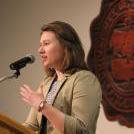-
Posts
16 -
Joined
-
Last visited
Reputation Activity
-
 Sandra Kruse got a reaction from Oklash in The Best Gap Year Ever
Sandra Kruse got a reaction from Oklash in The Best Gap Year Ever
@Oklash Thank you for sharing your experience! That sounds far from "the best gap year ever" Good luck to you in the future!
-
 Sandra Kruse got a reaction from ClassyBrat420 in Do I need to TA in Masters to get into PhD programs?
Sandra Kruse got a reaction from ClassyBrat420 in Do I need to TA in Masters to get into PhD programs?
The advice given to me essentially emphasizes scholarship and research experience over teaching experience. Writing Center work is a great bonus. I do not think that lacking a TA will harm you-- a PhD program is going to make you teach no matter what, so they likely won't emphasize that experience. That is all unless you feel like you want that experience before going into a PhD program. I feel comfortable without it.
-
 Sandra Kruse reacted to JustPoesieAlong in Do I need to TA in Masters to get into PhD programs?
Sandra Kruse reacted to JustPoesieAlong in Do I need to TA in Masters to get into PhD programs?
I think that the most benefit you get from teaching during an MA is the sort of first-year funding you may be eligible for in a PhD program. For instance, several of my acceptances came with a TAship in my first year specifically because of my previous teaching experience. Those who didn't have previous teaching experience either received different forms of funding for the first year--or, at worst, no funding until the second year. So, no, I don't think a lack of TA experience will prevent you from getting into a great PhD program, but it may limit your funding possibilities for the first year or more.
That said, while I'm grateful to have received first-year TAships for the PhD programs that accepted me, teaching during my master's program was brutal. I'm glad for what it added to my CV, but working at a writing center will probably allow you more time and energy to focus on your scholarship and building relationships with your advisors--things that will pay off immensely when you apply to PhD programs.
-
 Sandra Kruse reacted to Melvillage_Idiot in The Best Gap Year Ever
Sandra Kruse reacted to Melvillage_Idiot in The Best Gap Year Ever
I took a deliberate gap year after my MA for a couple reasons. For one, my partner wasn't done with her MS yet, so as a couple we weren't ready to move yet, but on another level, I wanted real teaching experience. I'd had some as a TA, but always under the supervision of a faculty member and never as instructor of record. My MA institution hired me as an adjunct and gave me a pretty decent courseload (3 classes last semester, 4 this), and that's been a great experience. My graduate coordinator here really hammered it in that taking a year to teach would look really good on my PhD application as well, so there's that CV-boosting benefit as well.
Also, though, taking a gap year has been great for my sanity. I got pretty burned out at the end of my program, so not being responsible for a reading list that summer was fantastic.
I'll echo some of the responses here that the life-application balance can be difficult. I managed to get through last semester and application season without much difficulty (take a few minutes every day to work on documents, and you'll be fine), but this semester's been tougher. Visiting and conferring with my potential programs is my highest priority right now, but I also don't want that to completely eclipse my responsibilities as a teacher. Striking that balance has been really difficult; I feel like my Literature classes have gone okay, but I do worry that I've done my Composition students a disservice.
-
 Sandra Kruse got a reaction from Oklash in What questions should I ask potential grad programs?
Sandra Kruse got a reaction from Oklash in What questions should I ask potential grad programs?
Congrats on getting into a program you're happy with!
When you applied you likely saw a little bit, but definitely ask about funding. My masters program wasn't funded, but after some faculty got to know me they pointed some scholarships my way. Ask about teaching, research assistantships, stuff like that. It might not be the biggest deal for you to find a funding source, but almost all of those look good on CVs.
If you're moving, ask about what the best neighborhoods are, where the good rent rates are, or if there are any property management companies to stay away from. This is an important part of being in a new place, but also is the kind of conversation that opens into where the good restaurants are, how the public transit works, and where the best places near campus are.
Do you have a sense of how big your cohort is? Ask to see how many students are typically in your coursework. How easy will it be to make friends? Chances are if you're visiting, you already have a head-start on making connections to the students already there. That's good!
If the department is research heavy, the faculty probably won't have any problem telling you about what kind of work they do. But if that should be the case, or if they're the kind of awkward professor type, ask them what kinds of classes they teach. What are their favorite classes to teach? I honestly find that is almost more of an indication of what kind of work you'll be able to do with them than what their last book was about. ---but even so that's not always the case!
I'm sure others will contribute. Good luck!
-
 Sandra Kruse reacted to LibraryLivingJT in The Best Gap Year Ever
Sandra Kruse reacted to LibraryLivingJT in The Best Gap Year Ever
I didn't take any purposeful gap years (I applied for three rounds and this is my first positive response round). I did a two year MA program, so I was in a bit of a similar boat. In my gap years, I worked (and am working) as a Visiting Lecturer in the English Dept. where I got my BA, teaching both literature and composition courses. After this spring, I will have taught 11 courses on my own. So much teaching experience has really helped me decide what I want to focus on and the kind of program that would be a good fit for me (a program that emphasizes both pedagogy and research).
While teaching I have been working on my own research, submitting articles to journals for possible publication, and attending conferences, as well as a summer institute.
My biggest piece of advice would be to make sure you take time for your own research/academic pursuits - this has been easier for me to do, I believe, since my "gap years" have still be spent in an academic environment.
In this gap year/gap years, be sure to attend conferences and/or institutes and make connections with faculty, even if those faculty do not teach at any programs you are applying to. Two of my POIs are faculty I met and worked with while at a summer institute, and I believe their letters of rec helped me in this application round.
-
 Sandra Kruse got a reaction from marisawhy in Mentoring English MAs
Sandra Kruse got a reaction from marisawhy in Mentoring English MAs
I totally understand your position! My undergraduate mentorship was honestly amazing. I had official and unofficial advisors in multiple departments. Because it was a smaller state school, the focus really was put on undergrads. The MA program I am currently in is also small. The faculty are great! But it's still a step back from the kinds of close relationships I'm used to. One part is definitely that it's only one year. But even so I have a hard time imagining that I could replicate the kind of mentor/mentee relationships of my past if I were to continue here for my PhD. It's not something that I ever could have guessed until I got here.
To be completely honest, it's important to have female faculty members who are familiar with the kind of work I do, who know the same scholars I want to know, and can really "be in my corner" as I go through my PhD. I don't need someone to hold my hand, I'm pretty independent, but I do want someone who is going to be there for me. Graduate school is such a mess of professional and emotional stress that it's important, to me, to have someone that can help guide both parts of that experience.
And some people just expect the rough and tough mentality of grad school. I won't be lonely that way. But it's hard to cut to the chase with a program to get at what they believe about mentorship. I'm still not sure what my strategy is going to be. Luckily, all my mentors from undergrad are still in touch with me and I can lean on them from across the country.
-
 Sandra Kruse reacted to Pezpoet in GRE Literature Subject Test: A Discussion
Sandra Kruse reacted to Pezpoet in GRE Literature Subject Test: A Discussion
Woof. I loathed the Subject Test. Here's my thinking, and please take it with lots of grains of salt. If you scored over 50 percentile, don't retake it. Even if you scored under, I'd warn against a retake. I mean, if it won't require a lot of stress or distraction from other parts of your app, then go for it. But I found it to be a huge waste o time. I tracked my study hours (thanks Toggl!) and came in around 100 total hours. I took the usual route of study, with notecards and timelines and reading important (short) texts.
Come game day, it did no good. There was very little on the test that had to do with recognition. It was, instead, 230 comprehension questions. Ok, that's probably hyperbolic. But truly, I was only asked to name an author or text a handful of times. I bet at least 180 questions were the kind of reading comprehensions comparable to the general GRE. SO. If you do decide to retake, focus on reading quickly but thoroughly. And answer every single question. I thought I'd have time to do at least two passes (shakes fist at Princeton) but no such luck.
As for what schools require it, I'm sure there's a list already floating around this forum somewhere. But, UVA, Stanford, USC, Indiana (?), are the few that come to mind.
Best of luck!
-
 Sandra Kruse reacted to M(allthevowels)H in Is a 157V enough for English MAs?
Sandra Kruse reacted to M(allthevowels)H in Is a 157V enough for English MAs?
I think it's safe to believe they look at the application as a whole.
For instance, you're applying to Tennessee-Knoxville. According to the Results board, they accepted a 156v in 2015, and rejected a 162. Madison-Wisconsin accepted a 158v and rejected 163 the same cycle. I did my undergrad at UC Riverside and am still close with a number of faculty, and I can tell you they don't give a single bent penny about the GRE when it really comes down to it. I'm sure your other accomplishments + GPA will overshadow a few points, if you're a good fit for a program.
Someone said the gradcafe GRE scores are skewed higher than average, which is probably true, so I'm sure it often looks like everyone who gets in is 166, but it's really just that everyone here is obsessive and reporting reflects community




